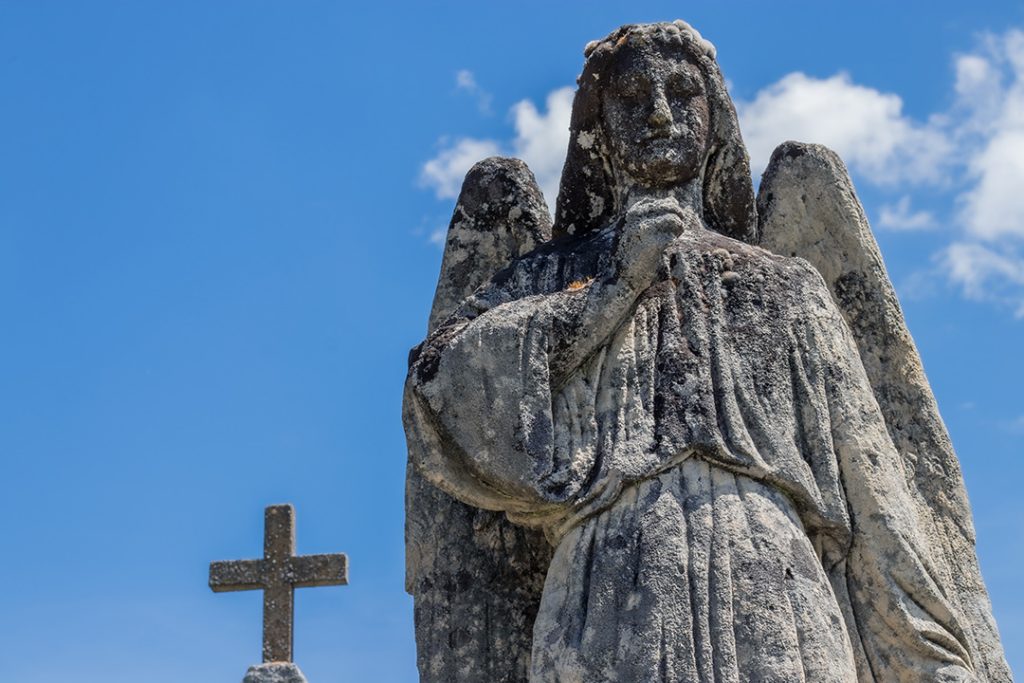Embracing the inevitable: Religion’s perspective on death anxiety
Embracing the inevitable: Religion’s perspective on death anxiety
Amidst our deepest fears, religion stands as an ancient source of comfort and solace. Explore how faith can offer purpose in the face of death anxiety.
Religion’s view on mortal fear
Fear of death is a universal human experience, transcending cultural, religious, and societal boundaries. Religion offers unique perspectives and coping mechanisms to address this existential fear.[1] Different faiths provide narratives, rituals, and afterlife beliefs that offer comfort, purpose, and transcendence.[2]
While religion plays a significant role, alternative secular approaches, such as mindfulness and rational contemplation, also contribute to the human exploration of mortality. In navigating the fear of death, individuals draw from a diverse range of responses, with religion being one integral facet. Understanding the roots and manifestations of this fear provides insight into the human psyche and the quest for meaning.[3]
Death anxiety in Christianity and Islam
In Christianity, the fear of death is often mitigated by the belief in salvation through Jesus Christ. Christians trust that by accepting Jesus as their saviour, they will attain eternal life in the presence of God. For example, the verse John 3:16 states, “For God so loved the world that he gave his one and only Son, that whoever believes in him shall not perish but have eternal life.”[4]
Within Islam, the fear of death is eased through the emphasis on submission to the will of Allah. Devout Muslims believe in the promise of paradise (Jannah) for those who lead righteous lives and faithfully follow the teachings of the Quran. This assurance provides solace in the face of mortality. As mentioned in the Quran(Surah Al-Imran 3:185), “every soul will taste death, and you will only be given your full compensation on the Day of Resurrection. So he who is drawn away from the Fire and admitted to Paradise has attained [his desire].”[5]
Mortal fear in Buddhism and Hinduism
Buddhism addresses death anxiety through the contemplation of impermanence. Practitioners seek enlightenment and aim to liberate themselves from the cycle of rebirth, known as samsara. By doing so, they aspire to transcend the fear of death and attain Nirvana, a state of ultimate peace. The Buddha himself emphasised impermanence, stating, “All conditioned things are impermanent. Work out your own salvation with diligence.”[6]
In Hinduism, the concept of reincarnation plays a central role in managing the fear of death. Hindus believe in the transmigration of the soul through multiple lifetimes,influenced by one’s karma. The ultimate goal is to achieve moksha, which represents liberation from the cycle of rebirth. This perspective offers a distinct approach to dealing with the fear of death, as individuals strive to break free from the perpetual cycle. As the Bhagavad Gita states, “For the soul there is neither birth nor death at any time. He has not come into being, does not come into being, and will not come into being. He is unborn, eternal, ever-existing, and primeval.”[7]
Across these diverse religious perspectives, a common thread emerges: the pursuit of solace and comfort in faith. Whether through trust in a higher power, the promise of an afterlife, or the pursuit of spiritual enlightenment, believers find reassurance in their respective religious doctrines. This shared aspect highlights the universal human need for a source of comfort when facing the existential fear of mortality.[8]
Religion as a coping mechanism
Religion serves as a powerful coping mechanism, offering profound insights into the human experience. Central to these teachings is the idea that life holds a purpose beyond our earthly existence. This belief provides solace to believers, as they find comfort in knowing that their actions carry a deeper significance within a spiritual context. It imbues their lives with a sense of fulfilment and direction.[9]
Additionally, beliefs in an afterlife play a crucial role in providing comfort to individuals grappling with mortality. The conviction of being reunited with loved ones or achieving a state of spiritual transcendence eases the apprehension surrounding death. These beliefs serve as pillars of support, offering solace and reassurance in the face of life’s most profound mystery.[10]
Faith-based strategies and rituals
In times of loss, religious communities provide invaluable support through a range of faith-based strategies and rituals. These structured practices offer believers a framework to navigate the grieving process. For example, last rites, funeral ceremonies, and commemorative rituals play a pivotal role in providing solace and closure, ensuring a sense of continuity in the face of loss.[11]
Furthermore, delving into the intricate relationship between faith and the fear ofmortality sheds light on the complex emotional landscape individuals navigate. It emphasises the significance of compassion, empathy, and communal support in helping individuals confront and ultimately transcend their fear of death. This intersection of faith and fear underscores the depth of human experience and the potential for spiritual growth in the face of life’s most profound question.[12]
Beyond religion: alternative coping strategies
In addition to religious beliefs, secular approaches offer valuable perspectives on confronting mortality. Practices like mindfulness and meditation provide individuals with tools to cultivate present-moment awareness, reducing anxiety and fear associated with death. Acceptance-based therapies, such as Acceptance and Commitment Therapy (ACT), encourage individuals to acknowledge and embrace their mortality as an intrinsic part of the human experience, fostering a sense of peace and acceptance.[13]
Furthermore, existential contemplation and philosophical reflection offer non-religious avenues to grapple with the concept of mortality. Engaging with existential questions about the nature of life and death can lead to a deeper understanding and acceptance of our finite existence. By embracing mortality as an inevitable part of the human journey, individuals can find solace and meaning in their lives, irrespective of religious beliefs. These secular approaches provide valuable tools for navigating the complexities of mortal dread.[14]
Between hope and fear
The fear of death is a universal human experience that transcends cultural and religious boundaries. Religion, with its rich tapestry of beliefs and practices, offers diverse perspectives on how to confront mortal dread. By understanding the multifaceted ways in which religion addresses this fear, we can cultivate compassion and support for individuals navigating the intricacies of mortality.
It is important to acknowledge that despite these coping strategies, the majority of individuals still grapple with a degree of apprehension towards death. This underscores the profound impact and complexity of this existential fear. Embracing the inevitability of death, whether through religious or secular means, ultimately leads to a deeper appreciation for the preciousness of life.
Our team of analysts conducts research on topics relating to religion and society. Find out their relationships on the EARS Dashboard.
Sources
[1] Die Angst vor dem Tod beherrschen
[2] Wie die fünf Weltreligionen mit dem Tod umgehen
[3] Leben mit dem Tod und der Trauer
[4] „… damit ihr nicht traurig seid“ – Christlicher Umgang mit Sterben und Tod
[5] Sterben im IslamTäglich an den Tod denken
[6] Welche Vorstellung vom Sterben hat man im Buddhismus?
[7] Die Bestattungskultur des Hinduismus
[9] Himmel, Hölle oder das große Nichts?
[10] Himmel, Hölle oder das große Nichts?
[11] Bräuche nach dem Tod: Trauerrituale aus aller Welt
[12] Facetten der Trauer Trauerrituale aus aller Welt
[13] Gläubige oder Atheisten Wer den Tod am meisten fürchtet






